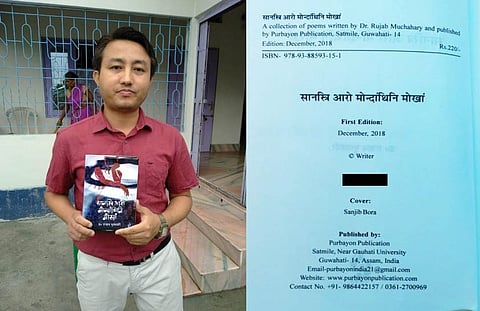
- Home
- Live Blog
- Breaking News
- Top Headlines
- Cities
- NE News
- Sentinel Media
- Sports
- Education
- Jobs

Kokrajhar/Chirang: Bringing laurels to the region once again, a Bodo writer Dr. Rujab Muchahary was selected for the Sahitya Akademi Yuva Puruskar, 2019 for his book of poetry titled, "Sansri Arw Mwndangthini Mwkhang".
A teacher at Rangia College in Department of Bodo, Dr. Muchahary has so far written and published four books to his credit. Born in the year 1986 October 31 at Diwanpara in Bijni subdivision of Chirang District, the young writer expressed happiness on winning the Sahitya Akademi Yuva Puraskar, 2019 and thanked all for the love and affection.
Various organizations including the ABSU, BSS and others also felicitated the young writer for winning the award and bringing name and fame.
The awards, to be given later this year, comprise caskets with engraved plaques and cheques of Rs 50,000.
It is to be noted that the Sahitya Akademi was formally inaugurated by the Government of India on 12 March 1954.
The Government of India Resolution, which set forth the constitution of the Akademi, described it as a national organisation to work actively for the development of Indian letters and to set high literary standards, to foster and co-ordinate literary activities in all the Indian languages and to promote through them all the cultural unity of the country. Though set up by the Government, the Akademi functions as an autonomous organization. It was registered as a society on 7 January 1956, under the Societies Registration Act, 1860.
Sahitya Akademi, India's National Academy of Letters, is the central institution for literary dialogue, publication and promotion in the country and the only institution that undertakes literary activities in 24 Indian languages, including English.
Over the 64 years of its dynamic existence, it has ceaselessly endeavored to promote good taste and healthy reading habits, to keep alive the intimate dialogue among the various linguistic and literary zones and groups through seminars, lectures, symposia, discussions, readings and performances, to increase the pace of mutual translations through workshops and individual assignments and to develop a serious literary culture through the publications of journals, monographs, individual creative works of every genre, anthologies, encyclopedias, dictionaries, bibliographies, who's who of writers and histories of literature.